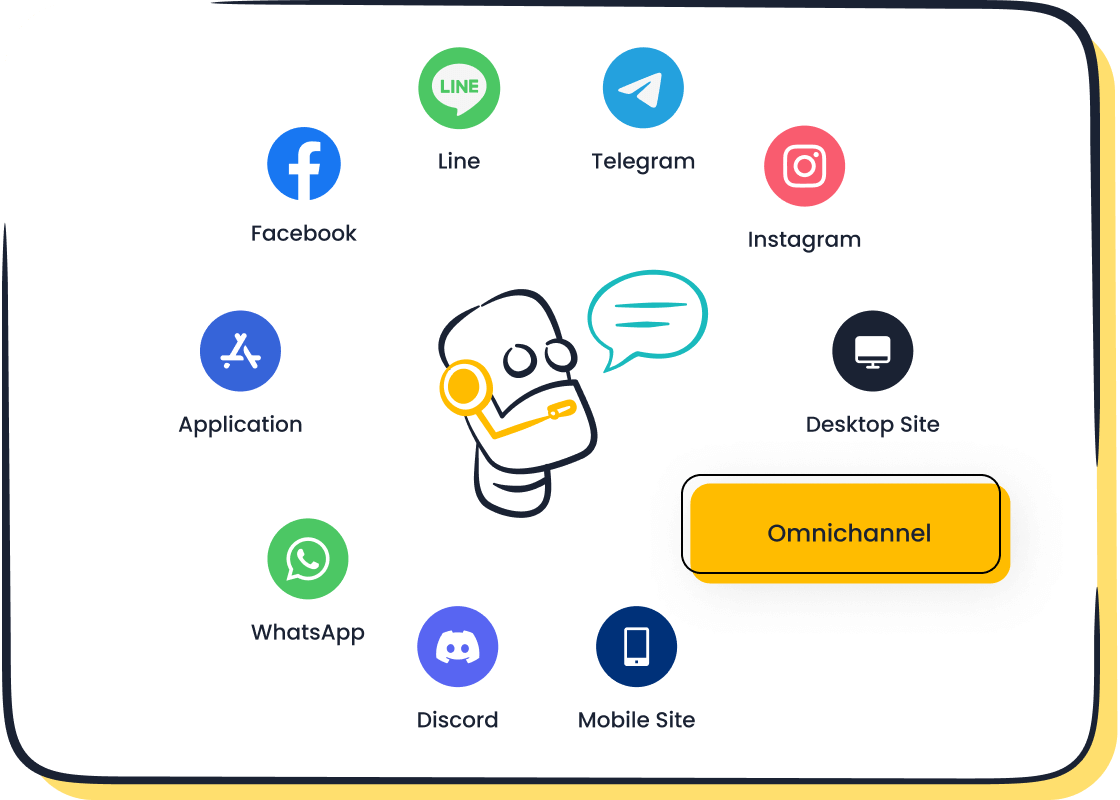The Future of Finance Chatbots and AI Integration

AI is revolutionizing how financial services operate. It simplifies complex tasks, such as loan approvals and fraud detection, making them faster and more accurate. For instance, JPMC achieved a 20% drop in account validation rejection rates through advanced AI-powered screening. A finance chatbot can further enhance customer service by offering instant, personalized assistance. Companies like Sobot are leading this transformation, helping businesses improve efficiency and customer satisfaction.
The Current Landscape of Finance Chatbots
Defining Finance Chatbots and Their Core Functions
Finance chatbots are transforming how financial institutions interact with customers. These AI-powered tools handle tasks like answering queries, managing transactions, and providing financial advice. They gained prominence during the COVID-19 pandemic by ensuring uninterrupted customer service while adhering to social distancing norms. Today, advancements in machine learning and natural language processing (NLP) have made these chatbots more interactive and efficient.
- Key functions of finance chatbots include:
- Assisting with fraud detection and prevention.
- Acting as virtual financial planners.
- Streamlining internal operations for financial institutions.
These capabilities make finance chatbots indispensable in modern banking and insurance sectors.
Benefits of Finance Chatbots for Customer Service
You can rely on finance chatbots to enhance customer service in several ways. They provide instant responses, ensuring your queries are resolved quickly. Their 24/7 availability eliminates the frustration of waiting for business hours. Additionally, they personalize interactions by analyzing your preferences and financial history.
For businesses, these chatbots reduce operational costs by automating repetitive tasks. They also improve customer satisfaction by offering consistent and accurate support. With AI-driven insights, finance chatbots can even predict your needs, enabling proactive assistance.
Real-World Applications in Banking and Insurance
Finance chatbots are already making a significant impact in banking and insurance. For example, Bank of America’s Erica serves 32 million clients, offering proactive spending insights and bill notifications. It also monitors recurring charges over 2.1 million times monthly. Similarly, JPMorgan Chase’s COiN analyzes complex loan agreements, reducing processing time from 360,000 hours to mere seconds.
In fraud detection, AI-powered chatbots have decreased false positive rates by 35%, saving $15 million in the first year alone. They also enhance customer service by improving first-contact resolution rates by 35% and cutting average inquiry resolution time from 8.5 minutes to just 3.2 minutes. These examples highlight the transformative potential of finance chatbots in delivering efficient and customer-centric solutions.
How AI is Transforming Customer Service in Financial Services

The Role of Machine Learning in Personalization
Machine learning plays a pivotal role in personalization within financial services. It analyzes vast amounts of customer data to identify patterns and preferences. This allows you to receive tailored recommendations, such as investment options or loan offers, based on your unique financial profile. For example, advanced personalization strategies can increase cross-selling success rates by up to 30%.
Machine learning also helps reduce customer churn by predicting behaviors and offering timely interventions. Businesses benefit from improved customer satisfaction scores, which can rise by 25% due to AI-driven personalization. Additionally, 76% of consumers prefer brands that personalize communications, leading to higher revenue and stronger customer loyalty.
| Metric | Description |
|---|---|
| Return on Ad Spend | Measures the effectiveness of audience generation using ML versus traditional methods. |
| Customer Satisfaction Scores | AI-driven personalization can lead to a 25% improvement in customer satisfaction. |
| Cross-Selling Success Rates | Advanced personalization strategies can increase success rates by 20-30%. |
| Customer Churn Rate | Comprehensive personalization strategies can reduce churn by 10-15%, preserving revenue. |
Natural Language Processing for Seamless Communication
Natural language processing (NLP) enhances communication by enabling chatbots to understand and respond to your queries in a conversational manner. This technology allows financial institutions to analyze textual data, such as annual reports or customer feedback, to extract valuable insights. For instance, research shows that the tone used in earnings conference calls can influence stock returns, highlighting the importance of effective communication.
NLP also improves financial reporting by predicting future performance based on narrative disclosures. It ensures that you receive clear and concise information, making complex financial concepts easier to understand. Studies reveal that 83% of customers are willing to share data for personalized experiences, further emphasizing the role of NLP in creating meaningful interactions.
Predictive Analytics for Proactive Customer Support
Predictive analytics transforms customer service by anticipating your needs before you even express them. AI models analyze your behavior and industry trends to offer proactive solutions. For example, banks use predictive analytics to identify unusual account activities and trigger fraud detection alerts in real time. This reduces stress and enhances security.
Companies like Verizon monitor network traffic to detect service disruptions before customers notice, ensuring seamless experiences. Similarly, Netflix uses behavioral analytics to recommend content and adjust video quality during buffering, improving user satisfaction. In financial services, predictive analytics streamlines onboarding processes, minimizes fraud risks, and enhances efficiency.
| Company | Predictive Analytics Application | Benefit to Customer Support |
|---|---|---|
| Amazon | Analyzes warehouse congestion and delivery patterns to anticipate shipping delays. | Proactively notifies customers about potential issues. |
| Verizon | Monitors network traffic to detect service disruptions before customers notice. | Fixes issues proactively, reducing customer complaints. |
| Banking | Employs AI to identify unusual account activities and trigger alerts. | Provides real-time fraud prevention, reducing user stress. |
Overcoming Challenges in Finance Chatbot Implementation
Addressing Integration with Legacy Systems
Integrating finance chatbots with legacy systems can feel like solving a complex puzzle. Many financial institutions rely on older systems that lack the flexibility to connect with modern AI solutions. You might face challenges like data silos, outdated infrastructure, and limited compatibility. These issues can slow down the adoption of automation and reduce the efficiency of your AI strategy.

To overcome these hurdles, you need a clear plan. Start by assessing your existing systems and identifying gaps. Use middleware solutions to bridge the gap between old and new technologies. Regular monitoring of system performance ensures smooth integration. Additionally, adopting scalable AI platforms like Sobot’s chatbot can simplify the process. These platforms offer omnichannel support, making it easier to unify customer interactions across various channels.
Ensuring Security and Privacy in AI-Driven Solutions
Security and privacy are critical when implementing AI in financial services. AI systems require large datasets, which increases the risk of breaches. You must address concerns about data misuse and surveillance to maintain compliance.
- AI introduces risks like biases in decision-making and vulnerability to cyber threats.
- Financial data is sensitive, and breaches can compromise customer trust.
- Transparency in how you use AI and data is essential for compliance.
To protect sensitive information, you should adopt robust security measures. Proactive monitoring of AI systems can help detect vulnerabilities early. Fortifying your security posture ensures the confidentiality and integrity of customer data. By prioritizing compliance and transparency, you can build a secure foundation for AI-driven solutions.
Building Customer Trust in AI-Powered Chatbots
Customer trust is the cornerstone of successful AI adoption. You can build trust by being transparent about how your chatbots work. Explain the algorithms in simple terms and highlight the benefits they bring. Customers feel more confident when they understand the technology.
The reputation of your firm also plays a significant role. A strong track record in compliance and customer support enhances trust. Human oversight is another key factor. When customers know that humans monitor AI systems, they feel reassured about the fairness and accuracy of decisions. By focusing on these strategies, you can strengthen customer trust and improve the adoption of AI-powered chatbots.
Future Trends in AI and Finance Chatbots

Voice-Enabled Finance Chatbots and Conversational AI
Voice-enabled chatbots are shaping the future of financial services. These AI-powered assistants allow you to interact with financial institutions using natural speech. They simplify tasks like checking account balances or receiving personalized financial advice. With speech recognition accuracy reaching 85-95%, these systems ensure smooth and satisfying user experiences.
Conversational AI enhances this by understanding your intent and responding appropriately. For example, if you ask about tailored financial advice, the chatbot can analyze your financial history and suggest personalized investment advice. Research shows that intent recognition accuracy exceeds 90% in controlled environments, making these systems highly reliable. Additionally, businesses using conversational AI report up to 40% cost savings per interaction compared to traditional support channels.
| Metric | Description |
|---|---|
| Speech Recognition Accuracy | 85-95% accuracy ensures user satisfaction. |
| Intent Recognition Accuracy | Exceeds 90% in controlled settings, ensuring precise responses. |
| Cost per Interaction | 30-40% lower costs compared to traditional channels. |
Hybrid Models Combining Human and AI Support
Hybrid models combine the efficiency of AI with the empathy of human agents. These systems allow AI to handle routine tasks while humans focus on complex issues. For instance, AI-powered assistants can provide personalized financial advice, while human agents step in for emotional or nuanced conversations.
This approach improves customer satisfaction by 20% and reduces operational costs by 30%. AI-based credit management systems also enhance efficiency, increasing credit approvals by 27% and reducing bad debt rates by 16%. By blending human expertise with AI, financial institutions can deliver faster and more accurate services.
- Benefits of hybrid models:
- Faster issue resolution.
- Improved customer trust through human oversight.
- Enhanced accuracy in financial decision-making.
Multilingual and Culturally Adaptive Chatbots
The globalization of financial services demands chatbots that adapt to diverse languages and cultures. Multilingual chatbots make financial services accessible to a broader audience. They can provide personalized financial advice in your preferred language, ensuring inclusivity.
Culturally adaptive chatbots go a step further by understanding local customs and preferences. For example, they can adjust communication styles to match cultural norms, fostering trust and engagement. Research initiatives like those by the Luxembourg Institute of Technology focus on enhancing these capabilities. By bridging communication gaps, these chatbots make financial services more inclusive and effective.
The Role of Sobot in Transforming Customer Service with AI Chatbots
How Sobot’s Chatbot Enhances Financial Services
Sobot’s AI chatbot revolutionizes finance by automating customer interactions and delivering personalized experiences. It operates 24/7, ensuring you receive instant assistance whenever needed. Its multilingual capabilities make financial services accessible to diverse audiences, while its omnichannel support connects seamlessly across platforms like WhatsApp and SMS.
The chatbot excels in handling complex queries, reducing wait times, and minimizing manual effort. It uses real-time monitoring and analytics to optimize customer interactions, ensuring proactive service. For example, its ability to anticipate customer needs improves satisfaction by addressing issues before they arise.
| Benefit | Description |
|---|---|
| Handling Complex Queries | Chatbots can manage intricate customer inquiries efficiently. |
| Reducing Wait Times | Automation leads to quicker responses, enhancing customer experience. |
| Minimizing Manual Effort | Automated workflows decrease human error and save time. |
| Providing Real-Time Analytics | Insights from interactions help optimize customer service processes. |
| Anticipating Customer Needs | Proactive service improves satisfaction by addressing issues before they arise. |
Personalization and Efficiency with Sobot’s AI Solutions
Sobot’s AI solutions redefine efficiency in finance. They reduce waiting times by 35% through smart integrations, ensuring smoother customer interactions. By leveraging cloud-based contact centers, Sobot upgrades systems to enhance customer engagement. Its omnichannel solutions eliminate disjointed systems, creating a unified experience for you.
Personalization is a cornerstone of Sobot’s approach. The chatbot analyzes your preferences and financial history to deliver tailored recommendations. This focus on personalized experiences boosts customer trust and loyalty. With AI-driven insights, Sobot empowers businesses to improve data analytics and optimize operations.
- Key statistics:
- 70% of Sobot’s contact center business comes from system upgrades driven by AI assistance.
- Omnichannel solutions minimize system issues, enhancing customer engagement.
- AI solutions reduce waiting times by 35%, improving customer experience.
Case Study: Opay’s Success with Sobot’s Omnichannel Solution
Opay, a leading financial platform, partnered with Sobot to transform its customer service. By implementing Sobot’s omnichannel solution, Opay streamlined customer interactions across social media, email, and voice channels. The integration of WhatsApp Business further enhanced customer engagement through targeted marketing.
The results were remarkable. Opay’s customer satisfaction rate soared from 60% to 90%. Operational costs dropped by 20%, while conversion rates increased by 17%. The intelligent IVR system allowed 60% of customers to resolve issues independently, reducing agent workload. WhatsApp messages achieved an 85% reading rate, demonstrating the effectiveness of Sobot’s solutions in improving customer experience.
Opay’s success highlights how Sobot’s AI-powered tools can revolutionize finance. By unifying customer interactions and enhancing engagement, Sobot delivers measurable results that build trust and loyalty.
AI and chatbots are transforming financial services, making them faster and more efficient. You can see this revolution in statistics like a 90% improvement in response times and enhanced trading accuracy. Strategic tools like Sobot’s chatbot help you overcome challenges and deliver superior customer experiences, ensuring the future of finance remains innovative and customer-focused.
| Statistic/Example | Description |
|---|---|
| 75% of financial firms using AI | A survey shows most financial firms have adopted AI technologies. |
| 90% improvement in response times | Jaja Finance improved efficiency with an AI-powered chat assistant. |
| Enhanced trading speed and accuracy | AI-driven systems execute trades quickly, improving market liquidity. |
FAQ
What are the key benefits of using finance chatbots?
Finance chatbots provide instant responses, reduce costs, and improve customer satisfaction. They also operate 24/7, handle repetitive tasks, and offer personalized financial advice based on your preferences.
How do finance chatbots ensure data security?
Finance chatbots use encryption, regular monitoring, and compliance with data privacy regulations. These measures protect your sensitive financial information and maintain trust in AI-driven solutions.
Can finance chatbots handle complex queries?
Yes, advanced chatbots like Sobot’s AI Chatbot manage intricate inquiries. They use real-time analytics and a knowledge base to provide accurate, efficient, and personalized solutions for your needs.
See Also
Simple Ways to Integrate Chatbots on Your Website
Tips for Selecting the Right Chatbot Solution
Best 10 Sites Utilizing Chatbots This Year
